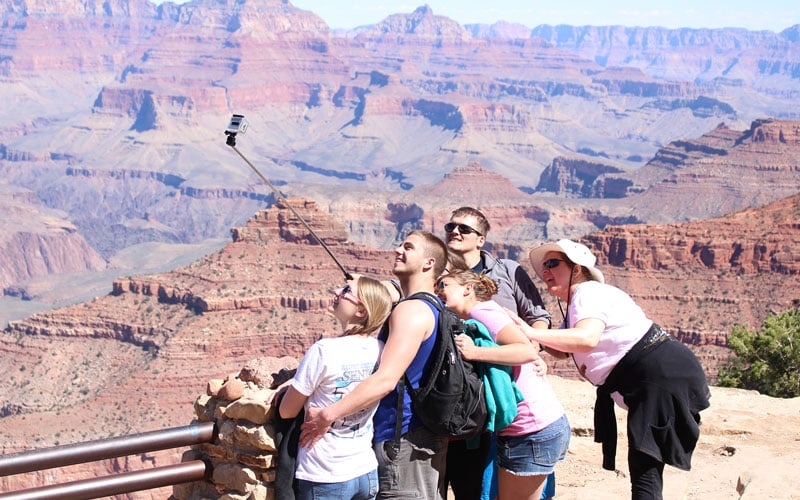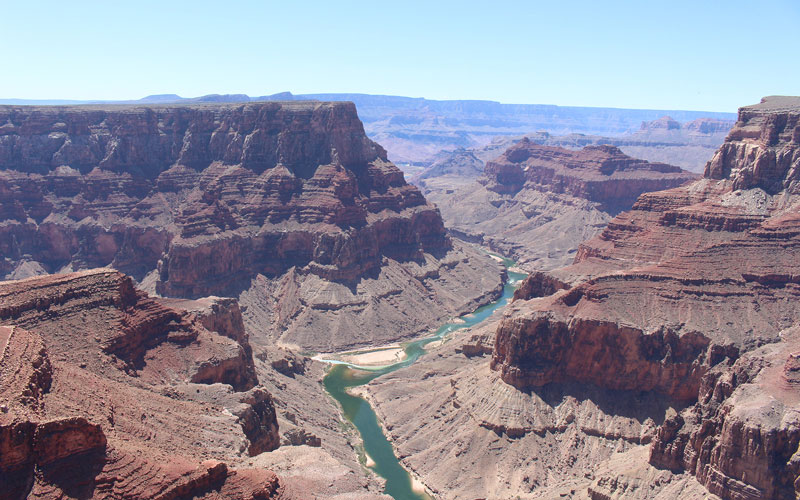
Tourists pose for a selfie in Grand Canyon National Park, which set an attendance record last year with more than 5.5 million visitors. Officials think the park will break that record this year. (Photo by Sophia Kunthara/Cronkite News)

Low gas prices and events surrounding the centennial of the National Park Service are expected to boost attendance at the Grand Canyon, which has $371.6 million in deferred maintenance projects. (Photo by Sophia Kunthara/Cronkite News)
WASHINGTON – Grand Canyon National Park officials say the park should break last year’s record of 5.5 million visitors this year, but advocates are worried the park may not be able to handle such large crowds.
They note that the park has $371.6 million in deferred maintenance projects, according to a National Park Service report, part of the total $11.9 billion maintenance backlog at parks across the country as of last fall.
But park officials said the Grand Canyon will be ready to welcome visitors this year as the National Park Service celebrates its centennial.
“We understand that visitation is high right now, so we’re doing our best to keep up with demand,” said Emily Davis, a spokeswoman at the Grand Canyon.
The park set a record last year of 5.5 million visitors, a 16 percent increase from 2014 – and it’s expected to set another record this year as low gas prices and centennial events attract tourists.
But Kevin Dahl, Arizona program manager at the National Parks Conservation Association, worries that those visitors might notice crumbling infrastructure as they enter the park.
“This is our centennial year,” Dahl said. “They (park visitors) should not experience poorly cleaned toilets.”
He said his biggest concern is that the water system will fail. Water system repairs are the biggest-ticket item on the park’s deferred maintenance bill, at an estimated $158.3 million.
Davis said the water system is complex and old – put in place in the 1960s – but is not necessarily worse off than it’s been in the past. She said the service has been repairing sections of it at a time, one recent section being at Phantom Ranch.
“We’re not expecting the increased visitation to use up all the water or anything like that,” she said.
But Jeff Ruch, executive director of Public Employees for Environmental Responsibility, said that park infrastructure like water systems will continue to deteriorate because those projects are “less glamorous” than new trails or visitor centers.
“The funds tend to go more toward trophy-like projects,” he said, calling the practice “mindless boosterism.”
Ruch is concerned that carrying capacities that were established in the 1980s have been abandoned by a National Park Service that he said “believes in visitation above all else.” That will be on display this year as celebration of the park service centennial is likely to result in long lines, he said.
Davis said that some centennial celebrations planned at the Grand Canyon include waiving fees for National Park Week this month, taking advantage of the park’s dark skies for “star parties” in June and holding a ceremony for Founder’s Day in August – events that are all expected to attract the public.
Ruch said the park service should stress public transportation over individuals traveling into the park by car, and that the service should find better ways to distribute visitors to less-populated areas of the parks.
“They (the park service) don’t want to admit there could be too much visitation because it’s how they measure their value,” Ruch said.
But Davis said there is no good way of determining carrying capacity in a park. They can count the number of parking spaces available, she said, but some people stay for a few hours while others may be there for days.
Davis said the park will continue to work on small maintenance projects as the tourism season ramps up, but there are no immediate concerns about infrastructure failing. In the meantime, she said, officials are trying to be as accommodating as they can this year.
“If people want to come to this park, we’ll let them into the park,” she said.